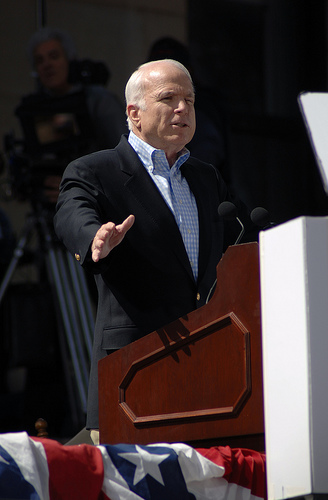Campaign Watch: An Early Ed Agenda John McCain Could Love?
Blog Post
April 16, 2008
 We've spent a lot of time over the past two weeks talking about the Democratic presidential candidates' early education agendas, so today we're going to devote some time to the Republican candidate, Senator John McCain. So far, McCain hasn't said much about education issues, and hasn't offered any sort of education policy agenda. That's hardly surprising, as McCain has never been particularly involved on education issues in the Senate, and education issues were not a major issue in the Republican primary campaign. Richard Whitmire reports that McCain's advisors are about to start unrolling a series of education proposals-but predicts they won't include a significant early education component.
We've spent a lot of time over the past two weeks talking about the Democratic presidential candidates' early education agendas, so today we're going to devote some time to the Republican candidate, Senator John McCain. So far, McCain hasn't said much about education issues, and hasn't offered any sort of education policy agenda. That's hardly surprising, as McCain has never been particularly involved on education issues in the Senate, and education issues were not a major issue in the Republican primary campaign. Richard Whitmire reports that McCain's advisors are about to start unrolling a series of education proposals-but predicts they won't include a significant early education component.
There are lots of good reasons for McCain's advisors to incorporate an early education component in the education agenda they're formulating. For starters, it would be counterintuitive, and it would also help cast a more positive light on some of the areas where McCain is weaker.
Further, it's probably easier for Republican politicians to support innovative ideas on early education than on K-12 reform right now. Conventional wisdom within the pundit class holds that teachers unions make it difficult for Democrats to advance compelling school reform ideas. But the politics of school reform are equally fraught for many Republicans. The conservative base loathes NCLB with a passion to rival that of the most strident teacher unionist and strongly opposes any expansion of the feds' role in schooling. Moderate Republicans know that the suburban parents they represent aren't thrilled by NCLB or reforms that might shake up a status quo that works pretty well for them now. And, as the Sol Stern controversy demonstrates, the conservative constituency for education reform is increasingly divided between choice-niks who think vouchers are the only answer, and devotees of curricular reform. In other words, for a politician who's never evinced a particular passion for education issues, the waters can't look too appealing in K-12 reform.
Early education looks much more favorable. Because we have a diverse delivery system in early education, new early education investments can flow to a variety of providers-including private schools, for-profit providers, and faith-based organizations-not just the existing public school system. Economic arguments have convinced leading business conservatives, such as CED president Charles Kolb, to support early education. And Republican governors, such as Bob Riley in Alabama or former presidential candidate Mike Huckabee in Arkansas, have been leaders in fighting to expand pre-k funding at the state level.
To be sure, fiscal conservatives, including McCain, are unlikely to embrace large federal universal pre-k programs. But there are plenty of things that McCain-or other candidates-could propose to improve early education without huge new expenditures. Last fall we released 10 low- or no-cost proposals to improve early education in the No Child Left Behind Act. We've thought of a few more early education ideas that might fit in well with a McCain education agenda:
Provide pre-k for children of active duty military personnel: Today, in our all-volunteer, professional military, more than 40 percent of active duty service members have children-and 40 percent of those children are under age five. The military has created an impressive system to provide high-quality childcare for children whose parents serve in the military. But military preschoolers should also have access to high-quality pre-k aligned with early elementary programs-something many currently don't get, or have only sporadically due to high mobility and differing state pre-k eligibility criteria. Both Texas and Kansas have policies that make children from military families eligible for publicly funded pre-k, and Maryland is considering similar legislation. Senator McCain could encourage more states to do the same by offering one-to-one matching grants to states that expand pre-k programs to serve children from military families. This investment would support quality education for military children and complement the military's current investments in childcare, and might cost around $500 million annually.
 Support charter schools that provide high-quality pre-k: Charter schools can play a valuable role in delivering high-quality, aligned early education programs in diverse settings. Senator McCain's education advisor, Lisa Graham Keegan, supports charter schools, and his home state of Arizona has the highest percentage of students in charter schools in the country. So it would seem natural for McCain to promote charter schooling as a strategy for improving early education and expanding access to pre-kindergarten. McCain could propose policies to expand the number of early education charter schools by: amending the federal charter schools program to support pre-k charter schools, encouraging states to remove barriers that prevent charter schools from offering pre-k, and requiring the Secretaries of Education and Health and Human Services to work together to help charter schools access federal funding streams for child care and early education.
Support charter schools that provide high-quality pre-k: Charter schools can play a valuable role in delivering high-quality, aligned early education programs in diverse settings. Senator McCain's education advisor, Lisa Graham Keegan, supports charter schools, and his home state of Arizona has the highest percentage of students in charter schools in the country. So it would seem natural for McCain to promote charter schooling as a strategy for improving early education and expanding access to pre-kindergarten. McCain could propose policies to expand the number of early education charter schools by: amending the federal charter schools program to support pre-k charter schools, encouraging states to remove barriers that prevent charter schools from offering pre-k, and requiring the Secretaries of Education and Health and Human Services to work together to help charter schools access federal funding streams for child care and early education.
Support parent choice in early education: Senator McCain supports greater parent choice in K-12 education. Parents already have a diverse array of choices in early education-but they often have trouble finding good information to help them make the best choice for their child. A growing number of states are creating online resources that provide parents with lists of childcare providers in their area, as well as access to quality ratings, inspection records, and other information to help them judge the quality of providers. And the privately operated Savvy Source for Parents offers profiles of local pre-k providers to help parents make informed choices. Senator McCain could support parent choice in early education by offering grants to states and private groups to create or improve online resources that help parents access reliable information about the quality of child care and early education providers.
Expand programs for preschoolers, toddlers, and infants with disabilities: In the Senate, McCain has voted on multiple occasions for full funding of the Individuals with Disabilities Education Act. IDEA provides grants to local school districts to help with the costs of educating school-aged students with disabilities. But it also includes programs to serve infants, toddlers, and preschoolers with disabilities. These programs are important, because early intervention is key to helping children with disabilities-especially those with severe disabilities such as autism-meet their full potential. Senator McCain could propose to expand these programs and also to allow states to use up to 15 percent of funding from them to provide preventive services for young children who have not yet been identified with a disability, but are at high risk for one-something IDEA already allows school districts to do with funds they receive for school-age students. We could expand these programs substantially for relatively modest amounts of money, and the investment could ultimately save money by supporting early interventions that reduce the need for more costly services later on.
Create high-quality alternative certification models for pre-k teachers: Whitmire notes that McCain supports Teach for America, which recruits talented recent college graduates to work in high-poverty schools. McCain could support a Teach for America-like initiative to expand the supply of high-quality preschool and early childhood education teachers. As states across the country expand universal pre-k programs and raise quality standards for them, many are facing difficulties in recruiting qualified teachers. Many experienced early educators have valuable skills but lack formal credentials. In order to keep these individuals in the classroom, build their knowledge and skills, and ensure and adequate supply of high-quality early educators, we need new, streamlined models of early educator training that focus on developing the skills and knowledge research has shown affect young children's learning. Supporting the creation and expansion of alternate route programs-such as Teach for America-for pre-k teachers would be a great way for McCain to support states' efforts to improve early education.
These are just a few, relatively low-cost proposals for things that conservative candidates and legislators could support to improve early education. Stay tuned for more coverage of early education in the election as campaign 2008 continues.
Photo of John McCain by flickr user PaisleyPitbull, used under a Creative Commons license.